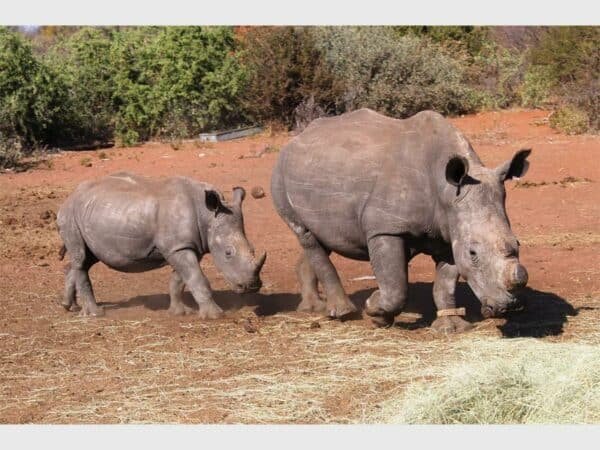
Rhinos have roamed Earth for over 50m years, with their prehistoric ancestors having lived long before the first elephants, but today, they stand on the brink of extinction.
While poaching numbers have decreased in recent years, partly due to the Covid-19 pandemic and intensified anti-poaching measures, the rhino population remains vulnerable.
“In the 1960s, Africa was home to 65 000 black rhinos. By 2022, that number had plummeted to just 6 487, leading to their classification as critically endangered.
“While white rhinos have fared slightly better, with numbers recovering from less than 50 in the 1960s to around 17 000 by the end of 2022, both black and white rhinos remain under constant threat due to poaching and habitat loss,” says Kate Church, the founder of African Wildlife Vets.
SA, which holds nearly 80% of the world’s rhino population, has seen over 8 000 rhinos poached since 2008, primarily for their horns, which are highly sought after in Asia for their supposed medicinal properties. While poaching numbers have recently declined due to intensified anti-poaching efforts and temporary relief from the Covid-19 lockdown, the battle for survival continues.
As a keystone species, their presence is crucial to the ecosystems they inhabit, essential for the survival of many other species, and for keeping the environment healthy.
A world without our natural landscapersHaving no rhinos would have a devastating and far-reaching effect on the ecosystems they inhabit. Just as elephants are professed as the world’s ecosystem engineers, carving out the land as they move through it, so, too, are rhinos the natural landscapers of the environment.
Their grazing behaviour helps to maintain open grasslands by preventing the overgrowth of vegetation, which in turn supports a wide array of other species, and according to research from Stellenbosch University, by wallowing in mud, they help to create natural waterholes and keep existing waterholes open.
Their dung – rhinos deposit more than 20kg daily – fertilises the soil and provides the foundation for complex food chains.Rhinos also play a vital role in sustaining other species through the smaller parasites they host on or in their bodies.
The economic impact of their lossBeyond their ecological importance, rhinos contribute to local economies, particularly through eco-tourism. Countries like SA, Namibia and Kenya depend heavily on wildlife tourism, with rhinos a major draw for international visitors.
“If rhinos were to disappear, the loss would not only be felt in the natural world but in human communities that rely on tourism for their livelihoods. This would lead to job losses, reduced income for local conservation programmes and diminished funding for wildlife protection,” notes Dalit Shekel, the CEO of Relate Bracelets.
The impact would also extend to local human communities that depend on the ecosystem services provided by healthy landscapes, including agriculture, tourism and natural resource management.
With the decline in biodiversity and the destabilisation of the environment, livelihoods that depend on eco-tourism, such as safari businesses, wildlife guides and conservation efforts, would be severely affected.
Conservation organisations like the Endangered Wildlife Trust (EWT) and non-profits like Relate Bracelets have been instrumental in the fight to protect rhinos.
Over the past decade, the sale of over 25 000 Relate Rhino Bracelets through Tourvest Destination Retail alone has contributed R360 000 to EWT’s rhino conservation efforts, supporting projects that expand safe spaces, enhance anti-poaching strategies and ensure genetic diversity.
As Shekel aptly puts it, “The loss of even one rhino profoundly impacts ecosystems, destabilising the environment and threatening the balance of their population. By supporting rhino conservation efforts, we are helping to protect an entire ecosystem, and every Relate EWT Rhino bracelet sold directly supports the survival of these incredible animals.”
At Caxton, we employ humans to generate daily fresh news, not AI intervention. Happy reading!
Stay in the know. Download the Caxton Local News Network App here.